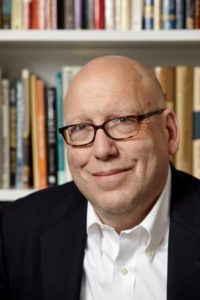American Judaism in in a pretty tight spot thanks to the relentless growth of secularization and those ever-elusive Millennials.
Equally as challenging is the freedom of – and from – religion available to Jewish people in the U.S., said Jeffrey Salkin, who pens the “Martini Judaism” column for Religion News Service and serves as the senior rabbi at Temple Solel in Hollywood, Florida.

Rabbi Jeffrey K. Salkin
“Jews have been so accepted in America, despite flareups of antisemitism here and there, that we take our identity for granted,” Salkin said.
The situation is all too familiar to Christian congregations and clergy. And like their Christian counterparts, Jewish leaders are scrambling to find solutions to the unrelenting social trends of individualism, do-it-yourself spirituality (if any) and the rejection of anything institutional, Salkin said.
But unlike some of other faiths, the answer for Judaism isn’t necessarily in attracting new members, but existing ones, he said.
“We are looking at converting Jews to Judaism.”
Salkin shared his concerns about the state of the faith in a recent column titled “Has American Judaism jumped the shark?”
He spoke with Baptist News Global about trends impacting religion as a whole in the U.S., and how Judaism is responding. The following are his comments, edited for brevity.
In your column you describe Judaism as being in a recession. Who needs to be reached to begin the recovery?
For the bulk of Jewish history, Jews did not actively seek converts. We have not been a proselytizing faith. That has changed to some degree in the last 40 years when we have been more open to people seeking conversion. But what I am talking about here is reaching in large part those who are already part of the Jewish people. It’s not about saving souls. It’s about making sure the Jewish people are enriched by their own traditions. What we are facing of course is a loss of faith in our institutions in our rituals and in our theology, and that is just part of a general American meltdown of traditional religion.
Is secularism the primary challenge?
I think that it is a combination of secularism, of individualism – the various ‘isms’ – and social issues that plague modernity in general. And in that sense, we are all captives of a larger American phenomenon. I have argued and will continue to argue that that this is the greatest cultural tsunami to hit Judaism since the late 1700s and 1800s with advent of the Enlightenment and emancipation from the ghettos of Europe.
Jews were presented with an opportunity, with the growth of critical thinking, to question their faith and scripture and to reform their way of looking at the world. The emancipation happened when Napoleon frees the Jews from the ghettos and they go into society and suddenly confront their identity – what it means to be Jewish and French at same time.
Judaism isn’t experiencing the sex scandals plaguing some Christian groups. Doesn’t that help?
We don’t see any wholesale crises in trust in clergy that would you would see in, for example, the Catholic Church right now. But we do see a diminishment in the relevance of clergy.
For example, I read the Sunday Times “Styles” section like other men read the sports section. I keep track of weddings, especially who is performing weddings. I would say from a third to a half of all weddings being performed are being led by people with quickie ordinations or a friend of the couple who is a life minister. It means that fewer and fewer clergy are having an impact on the most intimate and sacred moments in people’s lives.
Is Orthodox Judaism experiencing this crisis?
I think it is affecting Orthodoxy less than non-Orthodoxy. One, in general in Orthodoxy, the authority of the local rabbi is, if not unquestioned, at least respected. Two, people tend to be affiliated over the course of a lifetime. There is much less (faith) shopping. Three, while there are people who drop out and leave, most of the exits are people coming out of right-wing Orthodoxy. Modern Orthodoxy on the other hand has incorporated critical thinking into its way looking into the world.
Are synagogues responding by modernizing music and worship?
It’s been going on for 150 years. The Reform movement in Germany begins with these kinds of changes and now increasingly in synagogues there are bands. There is Shabbat Unplugged. In New York City per se these services have been very successful in attracting in Millennials and other young people. Those are rare circumstances. I’m not cynical about people who try gimmicks because at least they are trying. But many of these attempts are flash in the pan. People feel good but I’m not really sure it’s bringing them out the next time. But yes, the phenomenon of music and audio-visual aids is quite alive and well in American Judaism.
You mentioned Millennials. Are they as much a challenge to American Judaism as they are to Christianity?
Yes. The blessing of Judaism is that it cares very much about education and transmitting the tradition to the next generation. But what I have seen is a radical disengagement on the part of Millennials because they believe they can get their services on the run. I can get everything online. It’s also about the proliferation of choices. We are drowning in choices and America was founded on choice. America early on enshrined religious choice. That’s why you have more religious denominations in America than any other country in the world.
Do you see a way out?
I don’t know any more how we do it. I just don’t know how much longer a mainstream religious culture is going to be reliable. We’re all captives of this culture. There was a time when Judaism believed itself to be in battle with Christianity. That is no longer the case. We are now in battle with the secular culture. What we are facing now is a cultural struggle between holiness and the market place.


